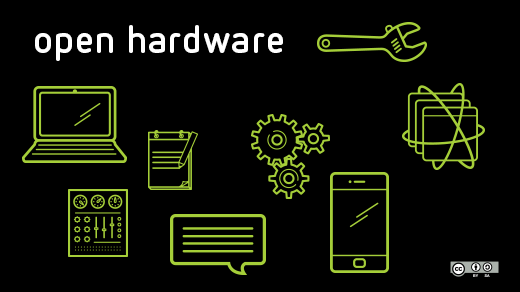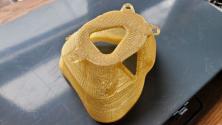Earlier this year, I shared my story about open source designs and my 3D printed prosthetic hand to a room of 4,600+ at Intel’s Annual International Sales Conference in Las Vegas. I joined Jon Schull on stage, the founder of e-NABLE, an online group dedicated to open source 3D printable assistive devices.
The reaction we got from our talk was unexpected—and it was one of the most awkward and exhilarating experiences of my life.
Jon thought I would be a good candidate for the Intel talk because I'm an active member of the e-NABLE community. I am involved in Research & Design, making these 3D printed prosthetic hands, and I actually use one myself. My hand was made from open source design files that are being shared all of the world at this very moment, and the hardware was made from a 3D printer and other materials you can get at a hardware store.
My hand in its current form, I call it the Talon, is made from:
- 3D printed plastic for the fingers, joints, and skeleton of the design
- nylon cable trimmer wire for the gripping mechanism
- elastic hair ties for the extension mechanism
- leather for the point of contact between the device and my skin
- velcro, rubber tool dip, and various types of stainless steel nuts and bolts

After I decided I would go and speak at the Intel conference with Jon, I realised that I had no idea what I was going to say. Luckily, I had been giving "the talk" and telling my story almost every day since I started using the Talon. At that time, most days I would ride the bus to my part time job as a FedEx package sorter, and because I would be wearing such an obviously not-natural hand, I was asked about it many, many times. These unfortunate souls would soon realise their mistake in asking as I gleefully jumped into a full narrative of how my hand works, how it’s made, the community around it… everything. I would talk their ear off until one of us got off the bus.
I was way more prepared for the talk than I thought.
And talk I did. I told the Intel crowd my story from nine months prior, when I saw a 5 year old child with a hand that was missing fingers, like mine, using a 3D printed hand to pick things up off a table. I the crowd how my father and I started making plans to make one for me, and how excited we were. It only took us two months to "hook me up" to a rudimentary hand we built using openly available design files and a 3D printer. Then, I told them how the raw materials we used to make it only cost $50.00.
At this point in the talk, I was not wearing my hand, my Talon. It was on a carabiner, clipped to my belt loop at my side. Then, I put it on to show everyone how to use it. And, something magical happened. In that moment my Talon went from this thing I was holding and showing them the mechanics of—to a part of my body. I could use it to hold something, shake the host's hand... and, people started clapping...
And, they kept clapping. Then, they started getting out of their chairs and on to their feet.
When I went back to watch the recording, I noticed it was a full minute of 4,600+ people standing and cheering for us. When you’re on stage, a minute feels like an hour. I felt the importance of this movement in that minute, the impact open source was having on the world, and what we can do together, collaboratively, rather than competively.
Later, I wished I could have said more about the open prosthetics movement. Like, how important it is to make these devices affordable and available to everyone with the desire and need to use one. And that we are combining centuries old technology—the Corporal Coles hand that utalised wrist motion to pull along "fingers" —with a futuristic manufacturing process—3D printing.
The crowd at Intel that day was inspired, and I hope this story has inspired you to support open source and a better way. The open source way. I am living proof.
Check out the e-NABLE website, and if you're interested in getting involved request an invitation to the G+ community page where you'll get access to new designs, ideas, innovations, resources, and our challenges.
Watch my Intel talk with Jon Schull here:
View the complete collection of Open Hardware Week articles.







2 Comments